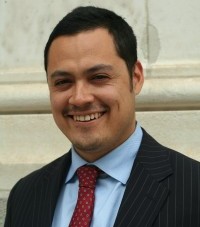 My brother, a young millennial, is devoted to his mobile device. He connects to social networks, videogames, and apps anywhere, anytime. He uses it to check sports scores, to buy movie tickets, and when it suits him, to ignore the rest of his family at the dinner table.
My brother, a young millennial, is devoted to his mobile device. He connects to social networks, videogames, and apps anywhere, anytime. He uses it to check sports scores, to buy movie tickets, and when it suits him, to ignore the rest of his family at the dinner table.
My younger brother is representative of the changing demographics and exponential growth in broadband technology usage now seen throughout the country. If you seek to engage my brother or his peers – politically, economically, culturally – your best shot is through his mobile phone or computer.
Think about how many digital devices you own. You probably own a lap top, cell phone, tablet or a video game system. Americans on average now own four digital devices and spend 60 hours a week using them. That is two and half days of your week in front of your computer writing memos, on your phone checking the weather, or, let’s be honest checking Facebook, Instagram, watching YouTube, Netflix, or indulging in any other personal digital passion.
Yet broadband technologies are limited in one big way — they can only connect people who have access to the technology. To truly harness the power of broadband we must expand deployment and increase access to this critical technology. As our nation’s demographics change, a more ethnically diverse America will depend more greatly on the services that high-speed broadband will offer.
According to the U.S. census in 2012 most new-born children were minorities. For the first time, Hispanics, Blacks, Asians and those of mixed race descent comprise a majority of all births in America.
The good news is that minorities across the country are enthusiastically embracing mobile broadband technologies. In fact, the Latino community uses smartphones at a higher rate than any other group and watches more hours of videos online, on their mobile phones than the national average. They also represent nearly 47 million traditional TV viewers in the U.S. Thus Latinos have rapidly adopted multiple-screens into their daily video viewing routines.
While Hispanics and other minorities are leading in mobile broadband usage, they lag in access to home broadband. According to the Pew Research Project, “74 percent of Whites and 62 percent of African Americans and roughly half of Hispanics have high-speed internet access at home.” While mobile broadband has certain advantages, greater access to wired broadband will help level the playing field for the nation’s minority communities. Thus, faster deployment of residential broadband is a critical component to unlocking the economic power of broadband access throughout our new America.
These data present a challenge and a potential opportunity for policy makers. The challenge is ensuring that the nation’s rapid embrace of broadband is shared by all of our communities. The opportunity, is finding a way to ensure that our country’s youth, the largest, most ethnically diverse generation in the nation, is able to utilize all of the opportunities presented by broadband. How we meet the challenge of engaging this new generation will have implications for the future of our country.
In Washington, initiatives are underway to confront this challenge. The Federal Communications Commission (FCC) recently announced a plan to start technology trials to spur the transition away from the nation’s aging telephone network to make way for modern next-generation wireline and wireless IP-based broadband networks. In response, AT&T was among only one of two telecommunications entities who filed proposals to begin a couple of local market trials in South Florida and Alabama.
In addition, President Obama recently unveiled his ConnectEd initiative designed to revamp the existing E-rate program to bring high-speed broadband service to classrooms nationwide. Additionally, the FCC has been hard at work to modernize its universal service program so that funding is more efficiently directed toward broadband services rather than antiquated telephone service.
Working together, targeted government efforts to expand broadband in unserved and underserved areas and communities, in combination with rules and policies designed to promote greater private investment in broadband infrastructure, will ultimately help speed high-speed broadband availability throughout the country.
Upgrading and deploying new high-speed broadband technologies closer to our homes, schools, community centers and businesses is vital to maintain our global competitiveness and to provide my brother and his generation the digital tools necessary to succeed in the 21st Century economy.
Kristian Ramos is a political strategist living in Washington D.C.
This article originally appeared in Fox News Latino

Recent Comments